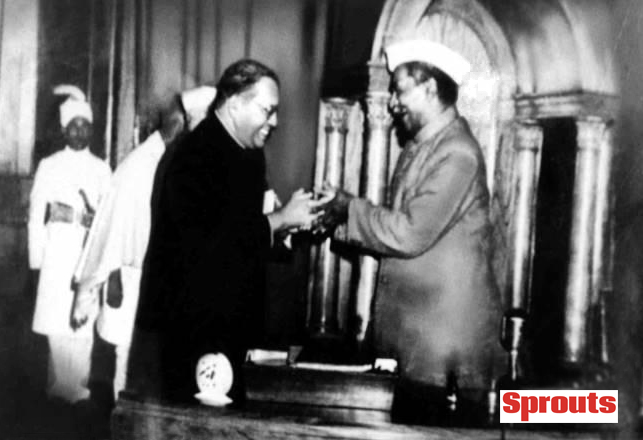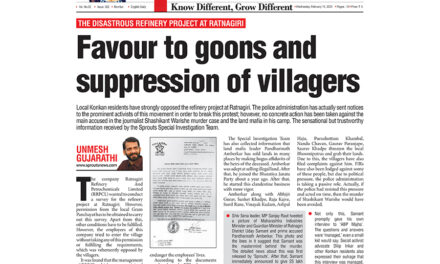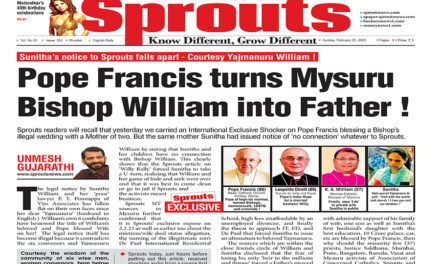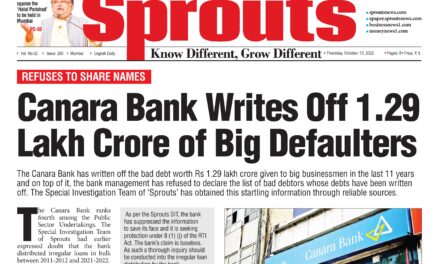Divakar Shejwal
divakarshejwal1@gmail.com
‘Bengali Babu’ Bibek Debroy is an economist and chairperson of the economic advisory council of the prime minister. He was the beneficiary of ‘Padmashri’ in 2015 and membership of the Niti Ayog. And in 2017, he became the chairperson of the economic advisory council, too. Debroy’s work of translating Ramayan, Mahabharata, Bhagvadgita, Ved and Puranas is more valuable than his contribution as an economist.
His article written on the 77th Independence Day in ‘Mint’ has attracted attention. Debroy, who asks what the country has gained since 1947 at the beginning of the article, is dreaming of a new constitution for the country in the Amrti Kaal. He has already indicated in the headline itself that the time has come for Indians to accept a new constitution. He has further said that the search should begin for the kind of constitution that country would require after 25 years, in 2047.
He questions the meaning of the words ‘socialist, secular, democratic, justice, liberty,equality’ in the Preamble of the Indian constitution. He wants to say that these values have become outdated and have to be nullified. It indicates how he perceives ‘new india’ and its new constitution. Where are the progressive ‘constitutional experts’ when the future of democracy and the constitution that maintains unity and integrity of the country is being demeaned?
The existing constitution of the country prohibits inequality and abnormal behaviour. Besides, it outlaws discrimination on grounds of religion, caste, creed, race, varna, region and gender. It guarantees equal opportunities to all. Though, its goal of eliminating social and economic disparities has not been achieved, the credit of stablishing equality before law goes to the constitution. It has ended privileges and supremacy gained on the basis of birth.
Why should anyone find this constitution harsh? Why should the need to remove it, be felt? It is noteworthy that the answers to these questions have come to the fore for the first time. And it has been given by the chairperson of prime minister’s economic advisory council. Therefore, It was bound to lead to a controversy.
After there was an uproar over the article, Debroy has clarified that the demand for a new constitution for the country, was his personal opinion. Of course, his clarification has no value. The stance of Prime Minister Narendra Modi is more important. It is utmost necessary for the country to know whether Modi and his government agree with Debroy. If this issue is not clarified, the meaning would be obvious.
In the past, BJP has tried to review the constitution during the regime of Prime Minister Atal Behari Vajpayee. A commission had been appointed under a retired justice of the Supreme Court Venkatchallaiah. Why were its conclusions and recommendations kept in cold storage by Vajpayee and his successor, Dr Manmohan Singh? If BJP is unwilling to answer this question, Congress should do it.
It has to be highlighted that Venkatchallaiah had undertaken the review after obtaining assurance from the Vajpayee government that the core structure of the constitution would remain intact. It is anybody’s guess, to what extent the review of the constitution was in tune with Vajpayee government’s dreams, considering Venkatchallaiah’s stance.
Against this background, it needs to be recollected what former President K R Nayaranan had said on the issue on the occasion of the golden jubilee of Independence Day. ‘First examine whether we have defeated the constitution, or we have failed because of the constitution,’ he had said categorically. The meaning of ‘Samvidhan Hatao’ does not necessarily mean picking up the constitution and throwing it in a corner. It will be naïve to think that the existing constitution is in place till the new one is launched. ‘Samvidhan Hatao’ means eulogising select provisions of the existing constitution as per the occasion, instead of uprooting it.
The conservation of the existing constitution and protection of democracy is the responsibility of all Indians, to conserve its invaluable provisions like equality for people of all castes, religions, creeds; the right to vote; the power to change unwanted rulers; fundamental rights and human rights; and the freedom of expression and liberty to profess any religion.
(Author is senior journalist, political analyst and member of executive committee of Mumbai marathi patrakar sangh.)










